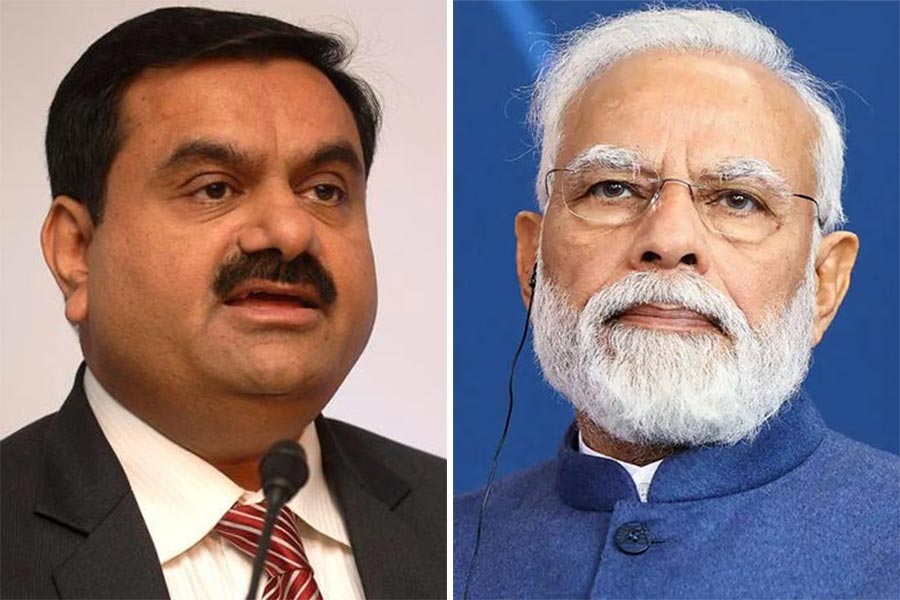The Congress on Thursday asserted that no instrument other than a joint parliamentary committee (JPC) on the Adani affairs will have the authority and scope to look into the whole gamut of issues involved.
Congress communications chief Jairam Ramesh said: “The (expert) committee (set up by the Supreme Court) is expected to look into the violations of Sebi rules.... It (the issue) is not restricted to Sebi rules. The main issue is the political-corporate nexus, what kind of relationship Narendra Modi has with Gautam Adani? We have asked 60 questions. The committee can’t find answers to that. How much will the government cooperate, what about Vinod Adani and shell companies?”
The Congress believes the expert committee can do its job but a JPC should be constituted to investigate bigger issues.
Ramesh recalled what he had said when the apex court first proposed the expert committee: “Where the allegations are of close, intertwined proximity between the ruling dispensation, the government of India and the Adani group, the setting up of a committee... can hardly carry any insignia or reassurance of independence or transparency.”
Arguing that an exercise has been initiated by the two principal actors — the government and the Adani group — to cover up, avoid, evade and bury all genuine scrutiny, Ramesh had said: “If the Prime Minister and his government are to be held accountable, any committee other than a JPC will be nothing but an exercise in legitimisation and exoneration.”
Persisting with his Hum Adani Ke Hain Kaun series, Ramesh said: “In 2018, the Indian Army selected the CAR 816 close quarter battle (CQB) carbine manufactured by the UAE-based Caracal International to replace its ageing submachine guns. Albeit done under the same ‘fast track procedure’ that led to the procurement of 72,400 SIG SAUER 716 assault rifles, the order for 93,895 carbines was abruptly cancelled in September 2020.”
He said: “On February 10, 2021, the army issued yet another request for information for an identical quantity of carbines to vendors, including Adani Defence. Given that our soldiers face an urgent requirement in eastern Ladakh following the Chinese incursions, are you prioritising your cronies over our soldiers in cancelling this contract and opening it to fresh bids? Are you not simply opening a path for another Adani monopoly, this time on the supply of carbines whose total requirement is projected at up to four lakh guns?”
Ramesh said: “On March 3, 2019, you inaugurated an Indo-Russian joint venture to manufacture AK-203 assault rifles at the OFB Korwa factory in Amethi. Curiously, Indo-Russian Rifles Private Limited (IRRPL), which is manufacturing 7 lakh AK-203 rifles, was excluded from a January 10, 2023, ministry of defence briefing on the CQB contract. You keep harping on the importance of Atmanirbhar Bharat (self-reliance) in defence, yet your government has excluded India’s largest indigenous small arms factory from bidding. Is it because you are once again helping your private-sector friends displace public-sector ventures that are currently supplying weapons to the armed forces? Are you concerned that an existing factory producing small arms at scale will outbid your close friends and deny them yet another opportunity to profit from Indian taxpayers?”
He added: “Indian armed forces have long been equipped with Israeli small arms such as Tavor assault rifles and Galil sniper rifles. In March 2020, Israel Weapons Industries (IWI) secured an Indian Army contract to supply 16,479 Negev NG-7 light machine guns.
“In September 2020, Adani bought a majority stake in the Gwalior-based PLR systems that had a joint venture with IWI, which put Adani in a position to monopolise any follow-on orders for Negev machine guns. If for argument’s sake, IRRPL is being excluded to help newer players, why is your close friend Adani being allowed to bid for the CQB contract? Is this not a blatant case of favouritism?”












